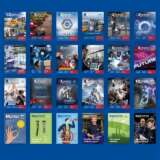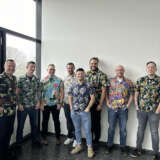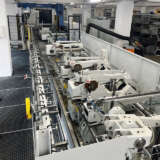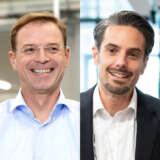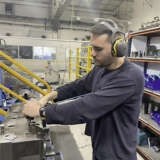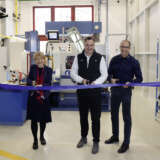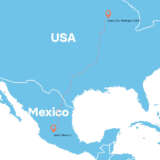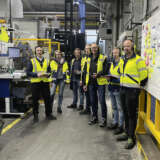“Now is the time to address our issues”
For about six months now, the KAMAX Group has been under a new two-person management team: Reinhard Rupprecht and Christoph Görtz. These two experienced managers combine KAMAX expertise with an outside perspective. Together they boast over 50 years of experience in the automotive industry. For Rupprecht and Görtz, 2024 will focus on the fundamentals. They hope in this way to restore our competitiveness and prepare KAMAX in the medium term for a stable and successful future. We spoke with the Global Executive Board (GEB) about our priorities for the year ahead, where they believe our challenges lie, and how they personally deal with the topic of focus.
Mr. Rupprecht, you’ve now had some time to get to know KAMAX a bit better and see how stressful the past two years have been for the company and its employees. What was the main reason for you to take on the position of Global CEO?
Reinhard Rupprecht
Rupprecht: Yes, that’s true. It was not an easy decision for me, but then it became quite clear: before I find myself confronted with someone I don’t even know, someone who is not familiar with the challenges facing KAMAX, and we are then forced to once again lose valuable time, I decided that I would rather do it myself – even if this meant that I would be forced to play a dual role for a time. My wife was not at all happy with the idea at first, because it meant even more work, and even less time at home. Soon, however, she saw that this also represented an opportunity, and that it would give me greater freedom to take the steps that I felt were necessary. I was certain – and continue to be certain – that I can turn things around at KAMAX. I would not have taken on this job otherwise. However, I am also well aware of the fact that this is no easy task, and that there will be a number of unwelcome decisions that must be taken. For me, the decisive factor was the people around me. I already knew most of the management team, and the European team in particular, who I am certain will be able to proceed without extensive support for a time and successfully implement the measures that have been initiated. This means, for example, that I will be able to pay greater attention to issues in Lapeer (USA) and León (Mexico) at present. I also enjoy my work, and I love it when I’m able to make a difference.
Mr. Görtz, what is your perspective after 6 months at KAMAX? What are the challenges for the Group CFO?
Christoph Görtz
Görtz: Putting it straightforward, the financial situation is very tight because of high investments and losses in the past few years. Therefore, my immediate focus was on keeping the cash situation stable. When Reinhard and I took over, we both had a very similar understanding of what needs to be done – ensuring that we achieve our budgeted results, generating cash and reducing overheads – the general costs that are not directly related to the manufacture of our products – to be efficient and competitive, and to maintain a cost structure that allows us to keep up with the competition.
This is what you have communicated in your “8 Focus Topics”. Are we able to implement all of these this year?
Görtz: That was precisely the problem in the past, that too many things were taken on at once. We now have to put the tasks in the right order so that they can be successfully implemented. And above all, we have to focus – that also means consciously dropping certain topics. These are difficult decisions because behind every activity, there is someone who has invested a lot of energy. I am counting on everyone to see the success of the company as a whole as the ultimate goal, and not an individual initiative. What we can see today, is that the first steps in the right direction were made, but more have to follow.
Rupprecht: Absolutely. We do not have any more time to waste. We need to do our homework, and do it quickly. Many of the measures have already been integrated into our 2024 business plan and must be successfully implemented. The plants are doing a great job here, with good, clear plans and additional short-term measures. You can also see this in Lapeer, where we have now defined a clear schedule we are implementing with the team. Some initial successes could already be seen during my on-site visits. I am confident that if we continue these efforts, we will succeed in controlling the situation. However, the cost-cutting measures must also include indirect areas, because after all, the things that these areas do are also reflected in the prices we are able to offer. We cannot simply ignore these issues, but must instead start doing what we can to combat them. Because our competitors are often cheaper than we are.
“I was certain – and continue to be certain – that I can turn things around at KAMAX.”
Reinhard Rupprecht
One item in this plan addresses the management culture at KAMAX and is aimed at strengthening it. Mr. Rupprecht, what is it that characterizes good management for you?
Rupprecht: For me, it is important that all of us in management are authentic and approachable in the things we say and do. We must offer people freedom to act, and trust them to find – and implement – solutions. This is just as true for me as it is for every other member of management at KAMAX. At the same time, I expect that our management – with clear targets and time frames – will also actively and independently take responsibility for reaching these targets. Naturally I realize that things do not always go as planned, and that is not a problem for me, as long as there is a plan. After all, there’s more than one way to skin a cat. For me, the best approach is one that is undertaken by the team together – it is then the manager’s job to steer, and motivate, accordingly. We have a lot of great professionals here to provide support, and the same applies to me – my door is always open to anyone looking for feedback. Basically, anyone who decides to take on a leadership position has chosen to actively take responsibility for their area. And at the end of the day, all of us should enjoy what we do and working with one another.
Taking responsibility is becoming even more important with the many challenges we are facing. What, in your opinion, are the biggest challenges facing KAMAX?
Rupprecht: The market situation, particularly in Europe, is going to become even more difficult – for the OEMs, tier 1, and us as suppliers. We firmly believe that Chinese vehicle manufacturers will be selling finished cars to the European market and gaining market share. The sales figures for our current customers are going to decline, and therefore our quantities sold will, too. Increasing cost pressures are also being passed on to us. We will have to fight even harder to win orders, and in the end, it is the price that will be decisive. This is only just the beginning: we need to become lean and ensure that we have a stable foundation for the future. We have a significant advantage here, and that is the fact that our plants in China offer us a chance to get our parts into Chinese vehicles. We must take full advantage of this position and actively cultivate the Chinese market.
Görtz: Another challenge is the economic stagnation in Europe and the resulting decline in consumer spending – for me, this means that we can no longer expect stable sales growth as we have in the past. This new situation requires a lean cost structure that works even without growth – lower indirect and overhead costs plus a greater focus on projects that contribute to our core business. However, this does not automatically mean that there is not a light at the end of the tunnel. We have to recognize and seize our opportunities. We still have great potential both in our customer portfolio and in the applications for automotive products.
In an environment like this, how can you ensure that KAMAX has a sound foundation?
Görtz: That is exactly what we aim for with the eight-point plan. We must be stable in the future, so we need to reestablish certain fundamentals. We start with the most urgent of these: stable performance, the avoidance of setbacks, and the generation of cash flow. Doing so supplies us with the financial leeway we need to tackle the bigger issues, for example, in our product portfolio and our production network.
“We will tackle our challenges, if we prioritize correctly and stay focused.”
Christoph Görtz
What is the status of ESG in the company?
Rupprecht: Primarily, we need to ensure that the money we invest goes into our systems so that we can eliminate the maintenance backlog. That is important if we want our operations to be successful. It goes without saying that we will also satisfy the requirements that our customers and banks have for us in terms of sustainability. That is a prerequisite for being able to receive new orders and financing. But it is my hope that if we improve our operations and are able to return these to profitability, that we will also be able to make more, targeted investments to increase sustainability – and not just to satisfy minimum requirements. Even so, we must first earn the money required for these efforts.
What is it that our competitors do differently? Is there anything that we might be able to learn from them?
Rupprecht: That is an excellent question. I believe that they began doing their homework a bit earlier than we did, and that they are in some cases leaner and faster than we are. A good example: we have a product for which our margin is bad. The first idea was to invest a lot of money in a new system. We rejected this idea, and instead tasked the team with identifying alternatives. It was only after examining the situation once again that we discovered that we already had a machine at a different plant that was capable of helping us to significantly improve our margin on this product. Of course, the machine was not simply standing around completely idle, but it proved to be no problem to transfer those parts elsewhere. Now, roughly one year later, we are moving this machine. We lost a great deal of time and money here though all the lengthy inter-plant coordination processes, worrying about causing offense, obtaining approvals, silo thinking, etc. We are definitely still too slow in this regard.
That is probably something that our focus plan can help us with in the future: making better decisions more quickly – because the criteria have been clearly defined. And seeing as we are talking about focus, this is an area where everybody can start with themselves. What is your approach? How do you achieve focus?
Rupprecht: Clearly it is not always easy to focus when you are being bombarded by emails and messages and your calendar is packed. Even so, I always try to focus on the task at hand, rather than attempting to do ten things at once. That is why I aim to structure my tasks according to their importance and urgency. Naturally, there are always unplanned things happening, so I must always be flexible. And whenever my feedback is required on something, I try to take care of it quickly so that I do not cause any delays. The members of our team have been doing their utmost, and not postponing these things is a matter of respect. It is for this reason that I draw up a realistic agenda for each day and work my way through it – it might well take until late in the evening to get through it, but that goes hand in hand with my position.
Görtz: That is a really good question, because it is not like I was always that way. It is something that I had to learn. You have to free your mind if you hope to be able to recognize the things that matter. Fresh air, physical activity, and sport are the methods that I use. These things allow me to step back from the activities of the day and become more creative. They free my mind so that I can recognize the things that need to be prioritized and then focus on them. And I believe that this is something that everyone can do. Everyone simply needs to find out how they can best achieve this.
Thank you for your insights and for taking the time to talk with us.
Read more about our areas of focus in KXConnect.
KXpress



